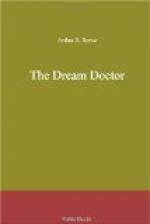From her lap a yellow telegram had fluttered to the floor, but before he could pick it up, she gasped, “The appeal—it has been denied.” Kennedy picked up the paper. It was a message, unsigned, but not from Kahn, as its wording and in fact the circumstances plainly showed.
“The execution is set for the week beginning the fifth,” she continued, in the same hollow, mechanical voice. “My God—that’s next Monday!”
She had risen now and was pacing the room.
“No! I’m not going to faint. I wish I could. I wish I could cry. I wish I could do something. Oh, those Elmores—they must have sent it. No one would have been so cruel but they.”
She stopped and gazed wildly out of the window at the prison. Neither of us knew what to say for the moment.
“Many times from this window,” she cried, “I have seen a man walk out of that prison gate. I always watch to see what he does, though I know it is no use. If he stands in the free air, stops short, and looks up suddenly, taking a long look at every house—I hope. But he always turns for a quick, backward look at the prison and goes half running down the hill. They always stop in that fashion, when the steel door opens outward. Yet I have always looked and hoped. But I can hope no more—no more. The last chance is gone.”
“No—not the last chance,” exclaimed Craig, springing to her side lest she should fall. Then he added gently, “You must come with me to East Point—immediately.”
“What—leave him here—alone—in the last days? No—no—no. Never. I must see him. I wonder if they have told him yet.”
It was evident that she had lost faith in Kennedy, in everybody, now.
“Mrs. Godwin,” he urged. “Come—you must. It is a last chance.”
Eagerly he was pouring out the story of the discovery of the afternoon by the little detectascope.
“Miriam?” she repeated, dazed. “She—know anything—it can’t be. No—don’t raise a false hope now.”
“It is the last chance,” he urged again. “Come. There is not an hour to waste now.”
There was no delay, no deliberation about Kennedy now. He had been forced out into the open by the course of events, and he meant to take advantage of every precious moment.
Down the hill our car sped to the town, with Mrs. Godwin still protesting, but hardly realising what was going on. Regardless of tolls, Kennedy called up his laboratory in New York and had two of his most careful students pack up the stuff which he described minutely to be carried to East Point immediately by train. Kahn, too, was at last found and summoned to meet us there also.
Miles never seemed longer than they did to us as we tore over the country from Ossining to East Point, a silent party, yet keyed up by an excitement that none of us had ever felt before.
Impatiently we awaited the arrival of the men from Kennedy’s laboratory, while we made Mrs. Godwin as comfortable as possible in a room at the hotel. In one of the parlours Kennedy was improvising a laboratory as best he could. Meanwhile, Kahn had arrived, and together we were seeking those whose connection with, or interest in, the case made necessary their presence.




